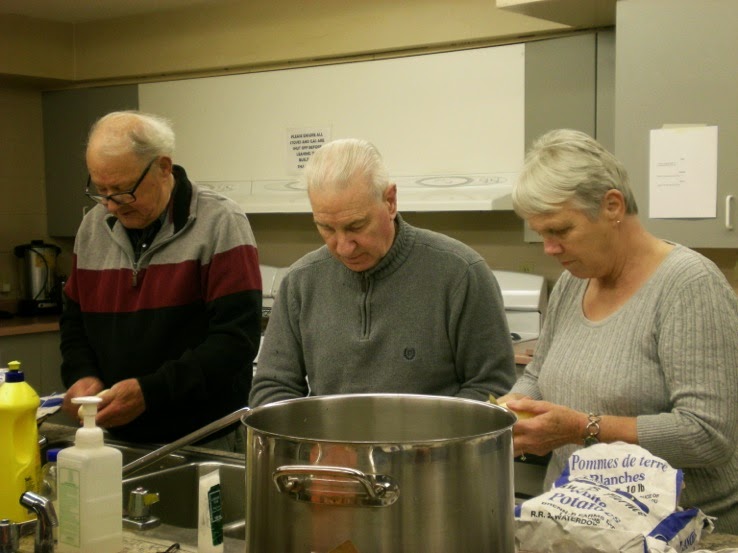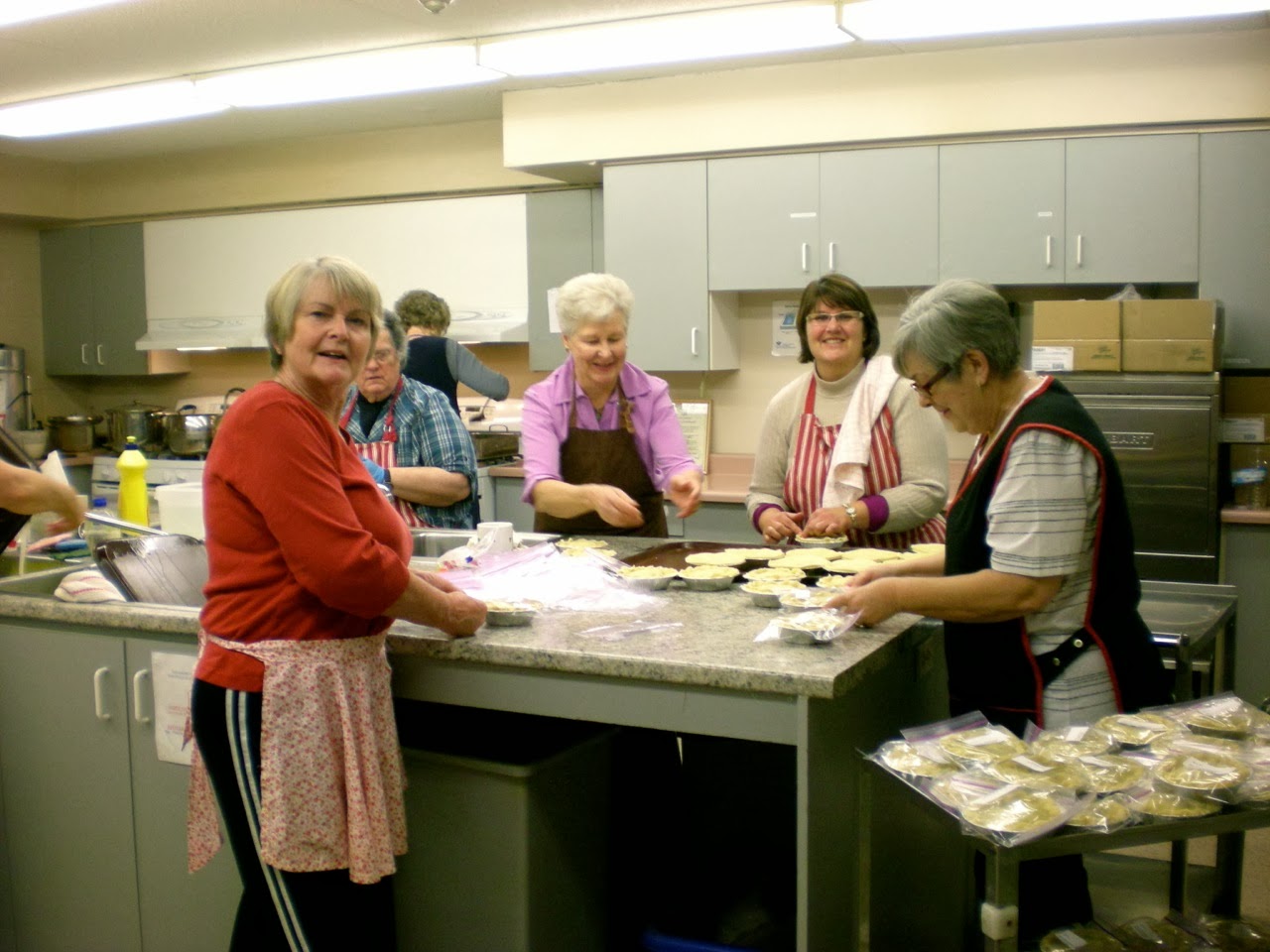Preparations are well under way for this evening's Roast Beef Dinner. We had an amazing morning crew! All ready for the next shift.
Attention STARS!
Calling all …
… St. Andrew’s Stars
Stars … Stars … St. Andrew’s Stars.
All Sunday Schooled aged (and older) children are invited to join the “STARS”. We will be recording this Sunday, March 30thafter church, on the second floor. If you have never participated please come to find out what all the fuss is about. We videotape short skits based on bible stories. These videos introduce the scripture readings the following Sundays.
If you have any questions please speak with Rev. Scott McAndless or Joni Smith.
Looking for a great movie!
There is a fantastic film playing now at the Ontario Science Centre in their IMAX theatre for a limited time. It is called Jerusalem and was produced by National Geographic with the participation and approval of the three religious groups represented in it. Because it is an IMAX film the visuals are incredible as you fly into Jerusalem and travel the streets and alleys of the city. The film completely draws you into it and makes you feel you are really there.
This is an incredibly beautiful and lush film about Jerusalem and the three major religions that come together in that very tiny space. It features three young women acting as our hosts who represent and reveal for us each of the three religions and as they individually show the quarter in which they live in Jerusalem, the rituals of their worship and their experience of faith in their family and community. The movie also features some fascinating archeological information about the rock on which Jerusalem was built.
The film is completely apolitical and does not discuss any of the conflict ever-present in Jerusalem. It instead focus' on the people, rituals, practices of the three religions and the places in which they worship. For some the lack of political acknowledgement may be a frustration, but for others it is a fantastic and clearly presented introduction to the three major religions through the eyes of young people growing up there.
I saw Jerusalem in Atlanta in January and envisioned all sorts of ways churches could use the film in their educational ministry programs. It would be great to take a youth group to the film and then go to a nearby restaurant and talk about what they saw, what was new for them, what they have questions about and what more they want to know as well as how we live in community together here in Toronto. It would be great for an adult or intergenerational group to do the same. It would be a great starting point for an in depth study on the major religions.
The movie is only 45 minutes long so leaves lots of time to meet afterward for discussion while it is still fresh in your memory.
The film is only playing at the Science Centre until April 17th, so make plans to see it. (taken from a letter from Tori Smit, Christian Education Consultant
Synod of Central, Northeastern Ontario & BermudaThe Presbyterian Church in Canada)
You can follow this link for more info: http://www.ontariosciencecentre.ca/imax/film/40/
New IMAX® Film:Jerusalem
Now Playing
Jerusalem takes audiences on an inspiring and eye-opening tour of one of the world’s oldest and most enigmatic cities.
What makes it so important to so many different cultures? How did it become the centre of the world for three major religions? Through the eyes of three young Jerusalemites – one Jewish, one Christian, one Muslim and their families, learn what it means to call Jerusalem home and experience celebrations and events that mark the high points of a year in the life of this city.
Also follow noted archaeologist, Dr. Jodi Magness, as she explores some of the most extraordinary historical sites in the region in order to better understand this crossroads of civilization. Gain a completely unique perspective of a part of the world that captivates the imagination of billions of people.
What makes it so important to so many different cultures? How did it become the centre of the world for three major religions? Through the eyes of three young Jerusalemites – one Jewish, one Christian, one Muslim and their families, learn what it means to call Jerusalem home and experience celebrations and events that mark the high points of a year in the life of this city.
Also follow noted archaeologist, Dr. Jodi Magness, as she explores some of the most extraordinary historical sites in the region in order to better understand this crossroads of civilization. Gain a completely unique perspective of a part of the world that captivates the imagination of billions of people.
Sunday School Lenten project
Last week (March 9th) we started a group project and individual projects entitled:
"Jesus loves me, just the way I am"
Here we are working on our very own mirrors and on the big, group mirror. The big, group mirror has mean names written on it, names that some people have experienced. Through weekly challenges we are aiming at being a positive influence for others as well as changing our views of ourselves. Eventually the mirror will have the "truth" written on it.
If you haven't joined us yet for this project, don't worry. We will be adding something special to our mirrors next Sunday! We have 3 more weeks to create our projects. If you finish your weekly challenge don't forget to tell Joni about it so that the group mirror can be changed.
Annual Meeting
Financial Review Component of the Annual Meeting
The Annual Congregational Meeting will take place this year in two parts. The first part will take place on Wednesday, March 19, 2014 at 7:30 pm. in the Fellowship Room off the Lower Hall. This meeting is open to all but particularly directed towards those who want a better understanding of the financial details of the life of the congregation, who have any questions or need some explanation of aspects of the budget and financial reports. We have set this meeting up because we recognized that not all were interested in sitting in on a detailed analysis of financial details and as a way to make sure all the necessarily information was made available.
This meeting will take place following our regular “Family Night” pot luck supper which runs from 5:30-7:30 pm every Wednesday night. You are always welcome to come out on Wednesday evening to participate and this particular This particular Wednesday evening might be a good time to come and join us to see how much fun we have!
Annual Congregational Meeting
The main component of the Annual meeting will take place on Sunday, March 23 following worship. After the service we will immediately proceed downstairs to enjoy a pot luck lunch in the lower hall. We ask you to help provide the lunch if you are able. If your last name starts with A-M please bring sandwiches or finger foods. If your last name starts with N-Z please bring a dessert. While we enjoy our lunch we will begin a celebration of our ministry and work in 2013 that will include brief presentations from various groups and committees in our church.
In addition we will also entertain a few necessary motions (such as the adoption of the 2014 budget and the naming of trustees) but, as the discussion of these issues will have already taken place, the focus will be on celebration. Please join us, it should be a lot of fun.
Roast Beef Dinner
Tickets are now available for our Annual Roast Beef Dinner!
Hosted by your Christian Education Committee
(this is our only fundraiser and funds our programs!)
Saturday, March 29th; 6:00 pm
Lent 2014!
Great news!
The latest addition of St. Andrew's voice is now online. Just click on the link of the home page.
Also, for a listing of our Lenten and Easter services you can click on the "Lent & Easter Services photo" on the home page.
An invitation …
Please join us on Sunday, March 2nd for The Sacrament of Holy Communion.
Worship service starts at 10:00 am with a luncheon and Cake Sunday to follow.
If you are able, please bring sandwiches or other finger food items to share for the luncheon.
Please no peanuts, tree nuts or shellfish.
Calling all STARS!
Our STARS will be producing 2 new episodes this week, Sunday, February 23rd.
Please meet on the 2nd floor after worship and Sunday School.
All new actors and friends are welcome.
Meat Pie time …
… it smells very good here!
The ladies are very busy today and tomorrow making individual beef and beef/vegetable pies!











